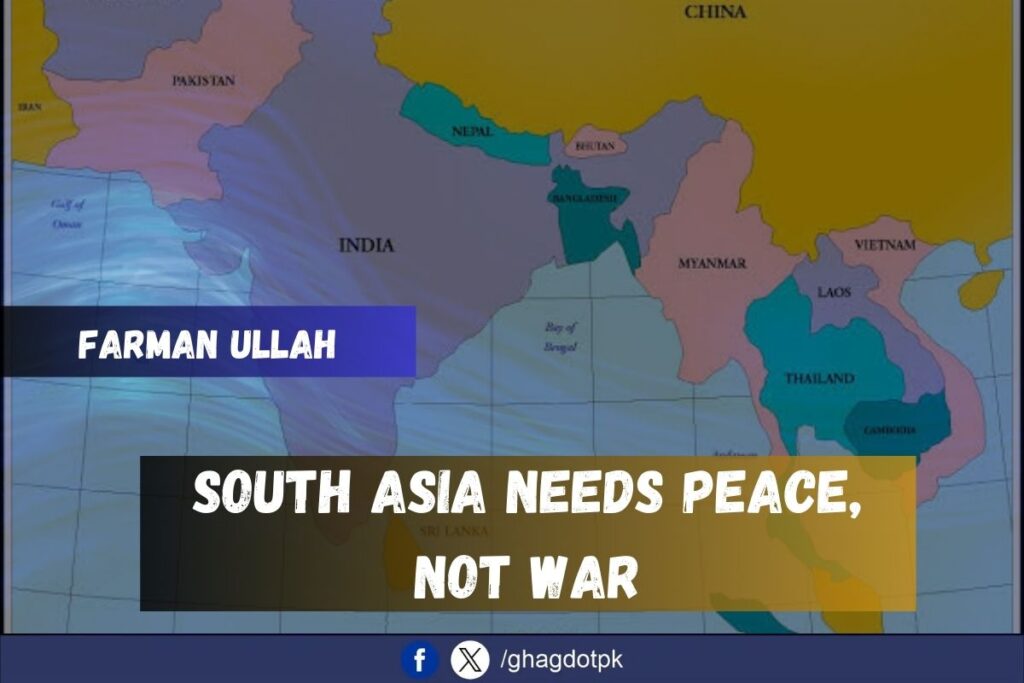By Farman Ullah
Right now, peace in South Asia is very fragile. That’s why it is essential for political leaders to stay calm and think carefully about the consequences of their actions. The region has a long history of conflicts, and the latest hostilities between India and Pakistan have brought the situation to a boiling point. Recently, there has been a small but positive change in how Pakistan is reacting to the recent conflict with India. At the start of last week, Prime Minister Shehbaz Sharif made a bold statement, saying the conflict was like “revenge” for the 1971 war. This shocked many people, even in Pakistan, where the memory of the war still evokes strong emotions.
However, later in the week, his tone became softer. He said that past wars between India and Pakistan brought “nothing but miseries” and that it’s time to have serious talks between the two countries. This change in attitude is a good sign. It shows that Pakistan understands that showing off or celebrating war is not helpful. The real problems between the two countries still need to be solved, and a more measured approach might be the key to finding a lasting solution.
Former Foreign Minister Hina Rabbani Khar also shared a peaceful message in Parliament. She said that India’s loss in the conflict is not something to celebrate. She added, “We should proudly support peace and be happy about a ceasefire.” She reminded everyone that war always brings death and destruction, and that is never something to cheer for. In fact, it is better to avoid war completely than to win one. History shows that countries become stronger when they stop fighting and start finding ways to live peacefully side by side.
This perspective is crucial in the context of South Asia, where the two major countries have been locked in a cycle of hostility for decades. Pakistan has a right to feel upset because it offered to work with India during the crisis but was ignored. People in Pakistan can also feel proud of their military for defending the country. But at the same time, both the leaders and citizens should focus on how to prevent future conflicts instead of letting them turn into full wars.
The recent conflict has highlighted the need for a more sustainable approach to relations between India and Pakistan. Both countries have suffered greatly in the past, and it’s time for them to take a step back and reassess their strategies. India must also take responsibility for its actions. It cannot keep going into violent clashes with Pakistan every few years. War should not be used as entertainment or a way to keep the public distracted. Whether they like it or not, India and Pakistan share a long border, a common history, and cultural connections.
India needs to stop trying to dominate the region. That approach only increases tension and makes peace harder to achieve. The recent fighting has done little good. Instead, it has created a dangerous situation where more weapons might be used in future fights. What real benefit do ordinary people in either country get from this? The answer is none. The people of both countries suffer the most in times of war, and it’s time for their leaders to take a more pragmatic approach.
Both governments should stop talking about war and start working for peace. If they do this, the people of the region will be thankful in the future. Peace is not just the absence of war; it’s a state of mind. It’s about understanding that differences can be resolved through dialogue and compromise. It’s about recognizing that the true enemies are poverty, hunger, and disease, not each other.
The path to peace is not easy, but it’s necessary. Both countries need to take small steps towards building trust and understanding. They need to engage in serious dialogue, not just about the issues that divide them but also about the common challenges they face. Climate change, economic development, and regional stability are just a few areas where India and Pakistan can work together.
The people of South Asia want peace. They want to live their lives without the constant threat of war hanging over their heads. They want their leaders to focus on development, education, and healthcare, rather than military might. It’s time for the governments of India and Pakistan to listen to their people and work towards a more peaceful future.
Peace in South Asia is not just a dream; it’s a necessity. Both India and Pakistan need to take a step back and reassess their strategies. They need to recognize that war is not the answer and that peace is the only way forward. The people of the region will be thankful if their leaders can work towards a more peaceful future. It’s time for South Asia to move away from the cycle of hostility and towards a path of peace and prosperity.
The future of South Asia depends on the actions of its leaders. Will they choose the path of war or the path of peace? The choice is clear. The people of the region deserve better than to live in constant fear of conflict. They deserve a future where they can live in peace and prosperity.






